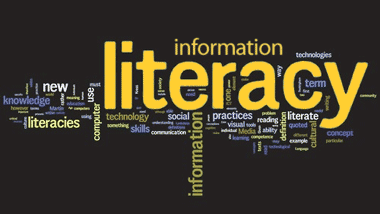
Information literacy is more than using library tools. Navigating our current information ecosystem requires engagement with “a richer, more complex set of core ideas.” (ACRL Framework for Information Literacy for Higher Education). UMD librarians have developed a set of questions to guide instruction that supports this engagement.
+
What is information literacy?
In the Framework for Information Literacy for Higher Education, information literacy is defined as “the set of integrated abilities [and knowledge] encompassing the reflective discovery of information, the understanding of how information is produced and valued, and the use of information in creating new knowledge and participating ethically in communities of learning.”
+
Why does it matter?
- Searching and evaluating information sources, identifying structures and systems, understanding creative and scholarly processes, contributing and sharing information/knowledge are all essential to participation in society and civic engagement
- Navigation within a complex information ecosystem requires knowledge and skill
- Developing information literacy skills and concepts is essential to success in an academic setting
+
What are essential questions?
In Understanding by Design, Wiggins and McTighe define essential questions as “provocative questions that foster inquiry, understanding, and transfer of learning.” The purpose of essential questions is to encourage engagement and exploration of the questions rather than answers. These questions define our priorities, inform instructional design, and facilitate ongoing engagement with key ideas.
+
What is their purpose?
- Designing library instruction around essential questions allows librarians to focus on encouraging inquiry, discussion, and reflection
- Engaging with broad concepts rather than isolated skills enables greater transfer of knowledge across contexts
- Clear priorities allow for the design of sessions that are distinct and differentiated from each other, creating a sense of progression and coherence
- Essential questions generate curiosity and creativity in the teaching and learning process
+
Our information literacy essential questions
- How can we know what we don’t know?
- What is the value of curiosity in research and in our everyday lives?
- What factors shape how easy or difficult information is to find and use?
- Why can’t we freely access all information?
- Why is the research process iterative?
- How can we recognize authority?
- Who is believed and who is questioned? Why?
- Why is scholarly conversation relevant?
- Why are some voices amplified and some voices silenced in scholarly conversations?
- How is the creation process reflected in a final product?
- How do we show that we value others’ work in our own?
- What rights should we have as information users, owners, and creators?
- How do we decide how to share our work?
+
What might this look like in your course?
You and your librarian will discuss your course and discover connections between course content and these essential questions. Based on these conversations, the librarian will design instruction that integrates information literacy into your course and facilitates exploration of a relevant essential question. Learn how to request instruction.